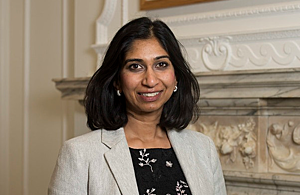- Communities Secretary and London Mayor joining forces to look at transition for London out of lockdown into the next phase
- New London Transition Board will draw on wide range of London expertise to restart the Capital
- A new London Recovery Board will oversee the wider economic and social long-term recovery
A new London Transition Board, co-chaired by the Communities Secretary, Robert Jenrick and the London Mayor will co-ordinate London’s response as it emerges from the lockdown and begins to reopen its economy while controlling the virus.
The programme of work being put in place will be the biggest since the end of the Second World War and will include opportunities for Londoners to be involved in setting priorities and shaping London’s recovery and renewal.
The Board will be made up of senior leaders from across the city and provide strategic direction for the next phase of response and restart, focusing on the key issues which London will face over the coming months, including:
- infection control
- phasing in and out of varying levels of lockdown
- recovery of public services, such as transport
Communities Secretary Rt Hon Robert Jenrick said:
I want to thank all of those across London who have worked in partnership with the government since the start of the pandemic to protect Londoners and keep essential services running. Now we are past the peak it is right that we focus on safely reopening the capital, taking the necessary steps to control the virus.
Through this new Transition Board, we will carefully build on the extensive planning already underway to get life and business in London – the most dynamic capital city in the world – safely back on track.
The Mayor of London, Sadiq Khan, said:
The COVID-19 pandemic is the most significant public health crisis in living memory. We are not being complacent about the continued threat from coronavirus, but the economic, health and social challenges arising from both the virus itself and from the lockdown are far-reaching, and London’s recovery will be a long and complex road that will take many months, if not years.
As Mayor, I am committed to securing a better future for Londoners. The city’s recovery from Covid-19 must ensure that nobody is left behind, and no one organisation or sector can tackle these challenges alone.
The measures announced today plan to bring together local government, civil and civic society, faith organisations, business, unions and Londoners themselves to reshape London as a city that remains open, safe and attractive for Londoners, visitors and investors.
Minister for London, Paul Scully, said:
As we fire up the UK’s economic engines again, we know that the capital will be pivotal to our national recovery. Supporting London’s extraordinarily diverse and dynamic businesses in getting back to work while keeping Londoners safe is essential. This plan gives us a roadmap for those efforts.”
Cllr Peter John, the Chair of London Councils, said:
London local government has made an enormous contribution on behalf of Londoners in response to COVID-19 to date. We now must be ready to work closely with all of our communities across the capital and with our key partners, including the Mayor, government and others to ensure that we are able to transition safely out of lockdown and pursue London’s economic and social renewal in a way that our city needs.”
Until the end of the year, the London Transition Board will run in parallel with and complement the establishment of London Recovery Board, chaired and constituted by the Mayor of London and Cllr Peter John, the Chair of London Councils. The Minister for London, Paul Scully, will attend the Recovery Board on behalf of government.
The London Recovery Board will plan and oversee the capital’s wider economic and social long-term recovery, developing a strategy and plan of action to reshape London to be fairer, more equal, greener and more resilient than it was before the crisis.
The context for this work is extremely challenging. We have seen a disproportionate impact of coronavirus on different communities who now face acute challenges, with this crisis exposing long-standing inequalities. Our local economies and high streets have been particularly affected, and there are significant pressures on London Councils, the GLA, TfL and others.
However, it is also an opportunity – to reimagine our city and define our aspirations and priorities for the recovery effort. A city where we build on the fantastic community spirit displayed by Londoners during these toughest of times, to deliver a cleaner, greener and fairer city, and work to create thriving neighbourhoods, with improved wellbeing and access to a strengthened healthcare system.
Long-term Covid-19 recovery planning has been taking place since March. The programme of work put in place will be the biggest since the end of the Second World War, dwarfing the response to the financial crisis and taking years to deliver. The work will be carried out in partnership with organisations from across sectors and across the city and will include opportunities for Londoners to be involved in setting priorities and shaping London’s recovery and renewal, as equal partners.


